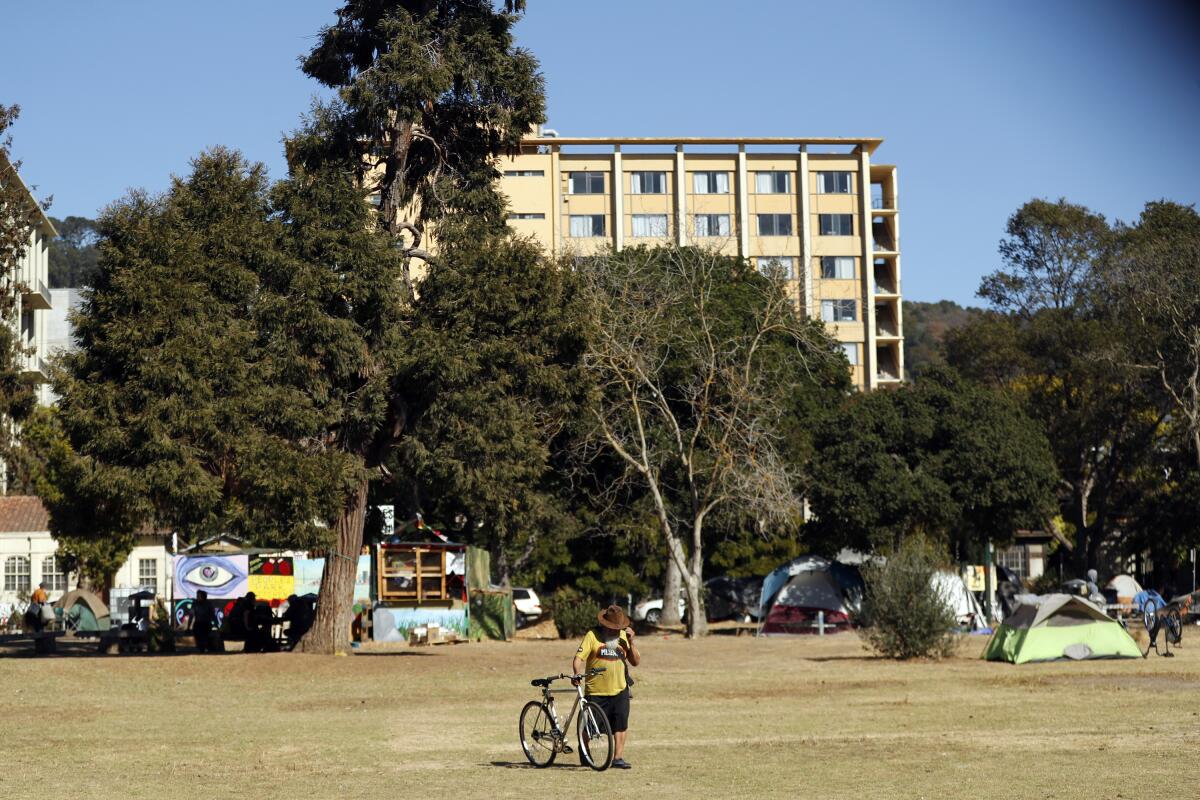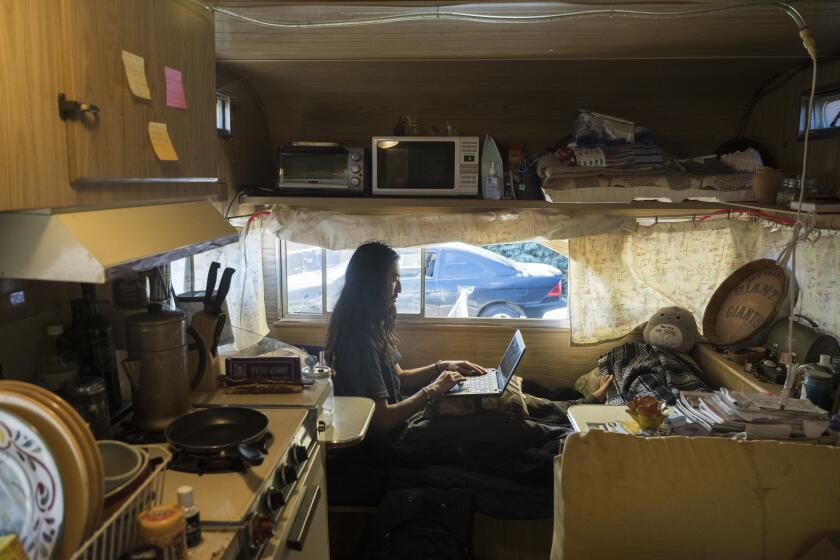Newsom signs bill to pave way for university housing. Critics say Berkeley’s People’s Park will be destroyed

- Share via
With the state facing a severe housing crisis, Gov. Gavin Newsom signed a bill into law that makes it easier for universities to build housing and overcome lawsuits from local residents about potential noise problems.
Assembly Bill 1307 becomes law after a pitched legal battle between local residents and the University of California system about the noise made by residents of a proposed housing project at UC Berkeley where neighbors objected to the “unruly parties” that college students might host.
The bill, which was signed Thursday, was drafted after a February ruling by an appellate court in favor of the neighborhood group — Make UC a Good Neighbor — and changed the California Environmental Quality Act (CEQA).
The passage of the bill means that the noise generated by project occupants will not be considered a significant effect on the environment.
“California will not allow NIMBYism to take hold, blocking critically needed housing for years and even decades,” Newsom said, using an acronym that stands for Not In My Backyard, referring to a popular sentiment among residents who oppose new projects in their neighborhood.
Litigation blocking student housing projects, a potential delay in state funding and escalating construction costs are among the challenges.
The legal imbroglio arose after UC Berkeley Chancellor Carol Christ proposed repurposing the famed and controversial People’s Park into a space that provided dormitory housing for more than 1,000 students — as well as supportive housing for 160 formerly homeless people.
For the record:
1:43 p.m. Sept. 8, 2023A previous version of this story said a student was killed in 1969 during a confrontation with police near People’s Park. The man who was killed, James Rector, was not a student but was visiting Berkeley.
People’s Park is a national symbol of political activism. The once vacant lot acquired by UC Berkeley in 1967 was turned into a flower garden and “free-speech zone” by activists shortly after. In 1969, after officers cleared the park, students marched down Telegraph Avenue to the site, where they had a bloody confrontation with cops. A man was killed and more than 100 protesters were injured.
Neighbors challenged the recent proposal in court and the 1st District Court of Appeals ruled against UC Berkeley and found that CEQA required the university to analyze and attempt to mitigate its project’s “social noise.”
The university did not adequately do that, the court said in its ruling in February.
The law sidesteps the court’s ruling and goes into effect immediately.
“AB 1307 reestablishes over 50 years of CEQA precedent, and reaffirms that people are not pollution,” said the bill’s drafter, Assemblymember Buffy Wicks. “Just as importantly, AB 1307 provides more certainty for housing projects across the state, instead of more red tape and higher construction costs.”
The court ruling had concerned some legal analysts who said CEQA could be used as a cudgel to keep certain groups of people — including young students — from moving into a housing development in a neighborhood.
“This would make CEQA a dangerous and powerful tool for any neighbor that does not like the social habits and customs of potential new residents,” Nicole Gordon of the Sohagi Law Group, which is representing UC, argued in a Jan. 3 letter to the court. “It is unfortunately easy to imagine this new ‘CEQA impact’ being applied to perpetuate prejudice and stereotypes.”
See which California cities are the most costly to live in. Several studies agree: The premium to live in California may be 40% to 50% over the national average.
But opponents of the bill said they did not oppose building more housing — they just did not want the housing built in this spot.
“Do you know that there are many alternative sites available for UC Berkeley to build the project proposed for People’s Park?” the group Make UC a Good Neighbor wrote in a letter to Newsom before he signed the bill into law. “Are you aware that the proposed project will violate every standard for urban green space from the international, national, state and local level? Do you know that opponents of this ill-conceived project favor the construction of more student housing, just not on a location that destroys a historic and much-needed open space?”
The group urged the governor to contact the local community and allow public input before he signed the bill.
“Do you know that there are many alternative sites available for UC Berkeley to build the project proposed for People’s Park?”
— A neighborhood group called Make UC a Good Neighbor
The law’s passage comes during a housing crisis across California that has created headaches for the UC system.
More than 400,000 students lack stable housing across the state’s three university systems — University of California, California State University and California Community Colleges — according to estimates from surveys conducted across the three systems. The struggle for housing is intensified by rising rents and schools located in upscale communities.
UC Berkeley is not the only school facing community backlash over a proposed project.
At UC Santa Cruz, a legal battle put a pause on a $750-million construction project that would create almost 3,000 beds for students on a much-loved meadow.
Times staff writer Teresa Watanabe contributed to this report.
More to Read
Sign up for Essential California
The most important California stories and recommendations in your inbox every morning.
You may occasionally receive promotional content from the Los Angeles Times.













